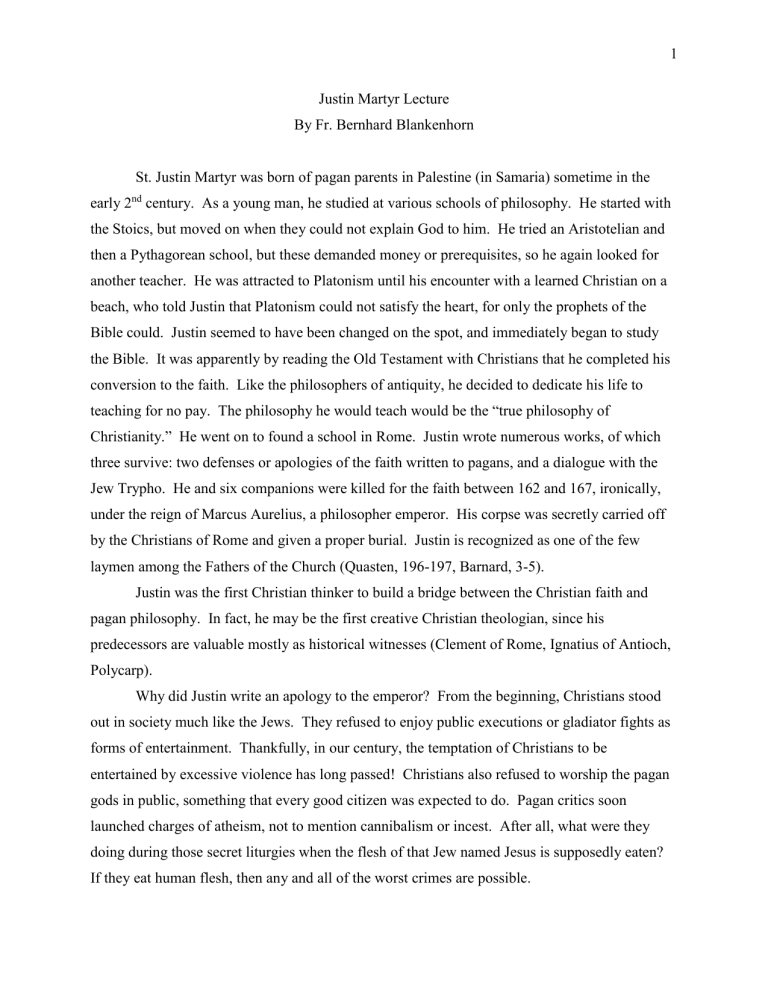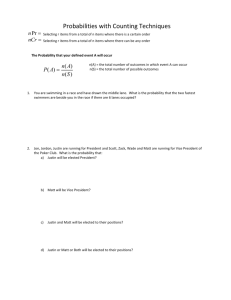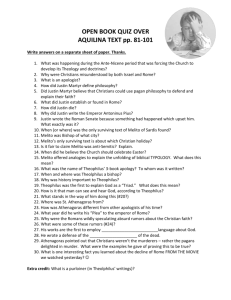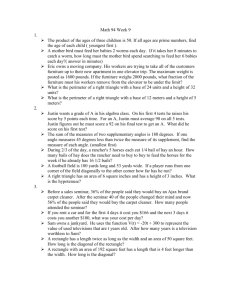doc - Blessed Sacrament Parish

Justin Martyr Lecture
By Fr. Bernhard Blankenhorn
St. Justin Martyr was born of pagan parents in Palestine (in Samaria) sometime in the early 2 nd century. As a young man, he studied at various schools of philosophy. He started with the Stoics, but moved on when they could not explain God to him. He tried an Aristotelian and then a Pythagorean school, but these demanded money or prerequisites, so he again looked for another teacher. He was attracted to Platonism until his encounter with a learned Christian on a beach, who told Justin that Platonism could not satisfy the heart, for only the prophets of the
Bible could. Justin seemed to have been changed on the spot, and immediately began to study the Bible. It was apparently by reading the Old Testament with Christians that he completed his conversion to the faith. Like the philosophers of antiquity, he decided to dedicate his life to teaching for no pay. The philosophy he would teach would be the “true philosophy of
Christianity.” He went on to found a school in Rome. Justin wrote numerous works, of which three survive: two defenses or apologies of the faith written to pagans, and a dialogue with the
Jew Trypho. He and six companions were killed for the faith between 162 and 167, ironically, under the reign of Marcus Aurelius, a philosopher emperor. His corpse was secretly carried off by the Christians of Rome and given a proper burial. Justin is recognized as one of the few laymen among the Fathers of the Church (Quasten, 196-197, Barnard, 3-5).
Justin was the first Christian thinker to build a bridge between the Christian faith and pagan philosophy. In fact, he may be the first creative Christian theologian, since his predecessors are valuable mostly as historical witnesses (Clement of Rome, Ignatius of Antioch,
Polycarp).
Why did Justin write an apology to the emperor? From the beginning, Christians stood out in society much like the Jews. They refused to enjoy public executions or gladiator fights as forms of entertainment. Thankfully, in our century, the temptation of Christians to be entertained by excessive violence has long passed! Christians also refused to worship the pagan gods in public, something that every good citizen was expected to do. Pagan critics soon launched charges of atheism, not to mention cannibalism or incest. After all, what were they doing during those secret liturgies when the flesh of that Jew named Jesus is supposedly eaten?
If they eat human flesh, then any and all of the worst crimes are possible.
1
2
Justin’s apology is in some ways modeled on another philosopher’s great apology.
Socrates offered an eloquent defense of his position just before his execution. Like Socrates,
Justin the philosopher defends his convictions as utterly rational. He also wants to present
Christianity as a way of life that includes the best of philosophy’s insights.
The first apology is addressed to the Emperor Antoninus Pius and two philosophers, including the emperor’s son. Clearly, the work was not just for the emperor. It was intended for the educated public, though the emperor himself may have read the text. It probably originated in his teaching activity, that is, public lectures to which anyone had access free of charge
(Markschies, 37).
Reading the Text
In chapter 2, Justin speaks as a philosopher to other philosophers. What is a philosopher?
One who loves wisdom, or who loves the truth. He follows the practice of Socrates by challenging his contemporaries to examine certain customs and beliefs with the light of reason.
The lover of truth must even be ready to die for the truth, which is precisely what Socrates did.
Justin himself will show that Christianity is the way of truth, the true philosophy, and is confident that a reasonable investigation of Christian beliefs and practices will lead those who do not yet believe to come to the same conclusion.
Chapter 3 challenges the Roman authorities to make a rational inquiry into the Christian
Church. Both the authorities and the masses must use reason, and not appeal to rumors or stereotypes. Justin then paraphrases Plato’s
Republic
: “Unless both rulers and ruled philosophize, it is impossible to make states blessed.” The phrase would have appealed to
Marcus Aurelius, the emperor’s son, yet ironically, Justin would be executed under the reign of
Aurelius. Justin also implies that the proper treatment of Christianity will lead to the well being of the state. He implies that the empire will in fact flourish if it treats Christianity with justice.
In chapter 5, Justin accuses the authorities of yielding to demons. The Romans believed that demons, which were not necessarily bad creatures, were everywhere. Justin follows one ancient Jewish school of interpretation in proposing that demons are fallen angels with bodies, and hence able to have sexual intercourse with women. The main inspiration for this strange doctrine is Genesis 6:1-4, one of the most obscure texts of the Bible, where “sons of God” were enticed by the beauty of women and begot children with them, leading to a race of giants. Later
3 in the First Apology, Justin tells us that since Christ’s coming, the demons’ main aim is to prevent conversion to him. They were the true instigators of Jesus’ death, and they continue to prevent the pagans from conversion by leading them to other forms of worship (Quasten, 212-3).
They also inspired the execution of Socrates (c. 5). What is the parallel between Socrates and the Christians of Justin’s time implied in chapters 5-6? Both were accused of atheism for critiquing the worship of multiple gods. Both were accused of “introducing new divinities.” The death of Socrates was actually a blow to the city-state of Athens, since it acted unjustly. The
Athenians repented almost immediately. Justin warns the Romans not to make the same mistake with the Christians.
In chapter 6, Justin tells us the object of Christian worship. Who do the Christians
“worship and adore”? He mentions the Father, “the most true God,” the Son, the good angels, and the prophetic Spirit. This sounds like polytheism. But Justin cannot be thinking that the angels are gods to be worshipped the same way in which God is worshipped. This is because the text’s entire argument is anti-polytheistic. We have to understand “worship and adore” in the broad sense of showing honor and respect or reverence. Justin does imply that honor is shown to the angels, suggesting that something like prayer to the angels was already present in mainstream second century Christianity. Like his fellow Christians, and in contrast to the Gnostics, Justin will insist on the continuity of the Old Testament and the revelation of Jesus Christ. That means
Justin presumes that monotheism is true. Angels can be honored as lower beings assisting God’s work. Justin’s Christian contemporaries clearly understood him this way. If he had advocated the worship of angels in the strict sense, he probably would have been treated as a heretic by subsequent Church Fathers, when, in fact, these Fathers never critiqued Justin as a polytheist. I am not aware of any historian who considers Justin a polytheist.
Chapters 6 and 13 present a rough summary of what we might call Justin’s Trinitarian theology. The Father is “the true God” and “maker of the universe.” Sts. John and Paul often speaks this way, without denying that the Son and the Spirit are divine or were involved in creation or are the true God. In John 17:3, Jesus calls the Father “the only true God.” Paul tends to use the term “God” as a synonym for the Father: “You can rely on God, who has called you to be partners with his Son Jesus Christ our Lord” (1 Corinthians 1:9). The New Testament also tends to attribute the work of creation to the Father, which is reflected in the Nicene Creed: “We believe in God, the Father the Almighty, Maker of heaven and earth ...” While neither John nor
4
Paul intended to deny the full divinity of Jesus and the Spirit, neither showed how these and the
Father are still one God. The divinity of the Spirit remains implicit in the New Testament. Early theologians like Justin are struggling to synthesize monotheism with the teachings of Scripture and tradition. He speaks of the Son having “the second place” to the Father, and the Spirit having the third place. Here and later in the First Apology , Justin proposes a kind of subordinationism, the notion that Jesus and the Spirit are divine but inferior to the Father. Before the Councils of Nicea and Constantinople, this was still an acceptable theology within
Christianity. Justin was integrating the Scriptures, the preaching of his forerunners in the faith and the philosophical tools available to him as best as he could. The Church had not yet adequately clarified the teaching of revelation.
Notice that chapters 6 and 13 make reference to cultic language: “we worship the Son,”
“we worship the prophetic Spirit.” Justin is reflecting the actual practice of the Christian community, one that was hardly new. The historian Larry Hurtado has shown that the worship of Jesus as a divine figure can be discerned in the earliest Christian circles, even in the 30’s and
40’s in Palestine, based on the practice and theology surrounding Jesus that St. Paul’s letters assume without having to argue the point. The idea that the divinity of Jesus was a late Christian invention has no scholarly foundation. As we will see with the 2 nd
century Gnostics, the first great controversy surrounding Jesus among those who claimed to be his followers did not concern the question “is Jesus divine?” but rather “is Jesus human?”. We already saw hints of this in the writings of St. Ignatius of Antioch and the biblical Letters of St. John.
Justin also emphasizes Jesus’ true and historical human existence: he was born and crucified (c. 13). In chapter 46, Justin proposes that there were Christians before Jesus appeared on earth. How can this be? Jesus is the Logos or Word, a clear reference to the Gospel of John.
Not only was everything made through the Word (John 1), but the Word was somehow present to human beings before the Incarnation. To whom was the Word present before 1 A.D.? The
Word was present to “those who lived reasonably.” Socrates and others were “partakers” or sharers of the Word. Why are these philosophers praised as Christians before Jesus? What is a philosopher? He or she is a lover of the truth, of wisdom. The Logos is truth and wisdom itself.
Thus, anyone who comes to know the truth about the world is a Christian. Remember that in
Justin’s age, philosophers were not just professionals or academics, but anyone who sought the truth for its own sake.
5
Plato and Platonism heavily influenced Justin. In Plato’s
Timaeus , God is called the One who is beyond being and knowledge. Between God and the world, Plato posits an intermediary celestial entity called the Logos. The Logos is the immediate source of order for the universe, bringing the chaos of eternal, unformed matter into harmony, shaping chaos into individual beings. Plato’s disciples would insist that God or the One is beyond our reach, but that by philosophical contemplation, the soul could ascend to its natural place, which is in the heavens with the Logos, and thus come to know all things. The 1 st century Jewish philosopher Philo of
Alexandria appropriated Plato’s and the Platonists’ teaching on the Logos and identified it with the personification of Wisdom in the Book of Wisdom. Philo set the stage for a profound synthesis of Greek philosophy and Christian theology, as he strongly influenced many of the
Church Fathers, including, it seems, Justin Martyr. Of course, the Book of Wisdom had already begun the synthesis of Greek philosophy and supernatural revelation.
For Plato and the Platonists, God or the One is utterly transcendent, too pure to be in contact with creation. Justin accepts this teaching. Like the Platonists, he sees the Logos as the intermediary between the Father and creation. God the Father does not create us directly or speak to us in revelation. That is why Moses speaks to Christ in the burning bush, and not directly to the Father ( First Apology 62). All of his action is through the Logos, whom Justin, inspired by the Gospel of John, identifies with the pre-existent Son of God, the one who became man in Jesus. The Son is divine, but he is not as divine as the Father.
Justin’s originality is found in his idea of the “seeds of the Word.” These seeds are found in every person, enabling him or her to recognize moral and religious truth, but not automatically. This doctrine allows Justin to explain why non-Christians and non-Jews could attain moral and religious truth. Every human being is naturally inclined toward Christ, yet the influence of the demons prevents many from coming to know the true Logos. But the seed only gives partial knowledge. The Logos is fully present in Christ, whose Incarnation reveals the fullness of truth, since truth is the Logos. All true philosophy is a preparation for the Gospel.
Justin set in motion a remarkable turn within Christianity, showing philosophically astute converts that their faith does not demand a rejection of their philosophical learning. Justin also inspired subsequent Fathers to appropriate philosophical tools (especially from Platonism) to dive into the mystery of Christ and try to explain it more fully (Justin Martyr, Second Apology 8,
10, 13; Barnard, 16-17; Quasten, 207-211).
6
But Justin was not content to explain the remarkable wisdom of the Greek philosophers by appealing to the seeds of the Word within them. In chapters 59-60, he offers another explanation. Where did Plato learn about the creation of the world? He learned it from Genesis, which tradition ascribed to Moses. In fact, we know that the claim is historically inaccurate. But
Justin’s theological argument is more important. His high praise of philosophy is tempered by this understanding of philosophy’s sources: it is through divine inspiration alone that we have learned the deepest truths of the universe. Today, we would not call that philosophy, but Justin saw philosophy and theology as one and the same. The difference between the wisdom of Plato and that of Moses was simply a matter of degree.
In chapter 58, Justin briefly mentions Marcion, “the heretic,” who denied that God made heaven and earth. We will deal with Marcion next week, as we study Gnosticism. Justin’s work barely betrays the immense internal turmoil that the Christians of Rome suffered due to
Marcion’s presence and eventual expulsion.
In chapter 63, Justin has rather harsh words for the Jews. We want to remember that his attitude is different from modern Anti-Semitism. Justin and the Christians are having a theological argument with their estranged siblings. The very violence of the polemics actually manifests the Christians’ Jewish intellectual roots (see my introductory lecture to this series).
The Logos appeared to Moses in the burning bush or as an angel, not the Father. This is because the Father cannot have direct contact with creation. Yet the same chapter also clearly affirms the divinity of the Logos: “the first-begotten Word of God, is even God.” What is the source of this phrase? We find it in the prologue of John’s Gospel.
Justin concludes the First Apology by describing the Christian Eucharist. Notice that
Communion is for believers who have been initiated through baptism. They must also be
Christians in good standing, meaning that they are “living as Christ has enjoined.” The Eucharist is not the sacrament of hospitality!
What is the order of the Eucharistic celebration? Chapter 65 is unique, in that it describes a liturgy that includes baptism, perhaps at Easter. Chapters 66-67 describe the usual format. On
Sunday, the memoirs of the apostles and the prophets are read. The term “prophets” probably refers to the whole Old Testament, not just the writings of the prophets like Isaiah. The apostles’ memoirs probably refers to the Gospels of Matthew, Mark and Luke, which record the apostles’ memories of the life of Jesus. When Justin uses the term “memoirs of the apostles” elsewhere,
7 he sometimes makes allusions to stories and sayings that are found in these three Gospels
(Barnard, 181-182). Then a president gives a verbal instruction, somewhat like a sermon. He also presides at the prayers over the Eucharist. After the sermon, prayers are offered
(intercessions). Then, bread and wine are brought forward and the president leads the prayers.
He does so “according to his ability.” Most of the texts of the prayers were not set at this time period. Only in the 4 th
century, when bishop with inadequate theological formation were sometimes appointed, men whose theology could not always be trusted for spontaneous
Eucharistic prayers, were set prayers introduced for the whole of the Eucharistic rite. After the people’s Amen, the Eucharist is distributed. The basic structure of the liturgy sounds like today’s Catholic Mass. Justin does not specify who “the president” is, but other 2 nd
century sources tell us that it was surely either the bishop or a priest. By the time that Justin wrote, every
Church except Alexandria was presided over by one bishop (Sullivan, 41-43). He is probably using the term “president” or “ruler” (a better translation of the Greek) since he is speaking mainly to non-believing Gentiles. He does not sense the need to use technical terms like bishop or presbyter (Barnard, 178-179).
But what is the Eucharist? Justin is strikingly explicit. It is not received as common bread and drink. What analogy does he draw in chapter 66? As the Word of God was made flesh in Jesus, so food blessed by the prayer of Jesus is Jesus’ flesh and blood. The prayer he mentions is the prayer at the Last Supper that Jesus says over the bread and the cup. The analogy clearly treats the Eucharist as the literal flesh and blood of Jesus. If not, then he would be proposing that the Incarnation was a symbol of God taking on flesh, which is clearly not his teaching. Justin also records the use of Jesus’ words from the Last Supper at the center of the
Roman liturgy for the transformation of bread and wine into Christ’s body and blood.
Justin’s teaching is entirely consistent with St. Ignatius of Antioch. None of Justin’s
Christian contemporaries or subsequent Church Fathers who read him contradicted his view.
Justin offers an invaluable witness to the faith and practice of the Roman Christians in the middle of the 2 nd
century. The convictions and customs of that community would surely have been known throughout the Church in the Mediterranean. We know from Clement of Rome’s Letter to the Corinthians that news of scandal traveled quickly, and Rome was at the center of attention, not just as the empire’s capital, but also as a Church founded by Peter and built up by St. Paul’s letter and presence as a prisoner. Justin shows that the Roman Christians’ liturgy and Eucharistic
belief in the 2 nd
century is essentially in harmony with today’s Roman Catholic practice and doctrine.
8
Bibliography
Barnard, Leslie William, St. Justin Martyr: The First and Second Apologies (New York: Paulist
Press, 1997).
Grillmeier, Alois, Jesus der Christus im Glauden der Kirche , vol. 1 (Freiburg im Breisgau,
Germany: Herder, 1979).
Hurtado, Larry, Lord Jesus Christ: Devotion to Jesus in Earliest Christianity (Grand Rapids,
Michigan: Eerdmans, 2003).
Markschies, Christoph, Gnosis: An Introduction (New York: T&T Clark, 2003).
Quasten, Johannes, Patrology, Vol. 1: The Beginnings of Patristic Literature (Westminster,
Maryland: Newman Press, 1949).
Sullivan, Francis A., S.J., Magisterium: Teaching Authority in the Catholic Church (Eugene,
Oregon: Wipf & Stock, 1983).
Copyright © Bernhard Blankenhorn, 2007
9







![The Irony of Love (122) [by Proud 86].](http://s3.studylib.net/store/data/007306595_1-aca9830606a408d7bdeb2a12d7258405-300x300.png)

